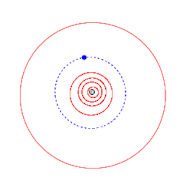 Orbits of Serpe (blue), the inner planets and Jupiter (outermost) | |
| Discovery [1] | |
|---|---|
| Discovered by | H. Debehogne |
| Discovery site | La Silla Obs. |
| Discovery date | 4 May 1992 |
| Designations | |
| (9968) Serpe | |
Named after | Jean Serpe (Belgian physicist)[2] |
| 1992 JS2 · 1977 VT 1985 SC2 · 1988 KR1 | |
| main-belt · (middle) | |
| Orbital characteristics [1] | |
| Epoch 4 September 2017 (JD 2458000.5) | |
| Uncertainty parameter 0 | |
| Observation arc | 39.56 yr (14,451 days) |
| Aphelion | 2.6974 AU |
| Perihelion | 2.4354 AU |
| 2.5664 AU | |
| Eccentricity | 0.0510 |
| 4.11 yr (1,502 days) | |
| 346.96° | |
| 0° 14m 22.92s / day | |
| Inclination | 12.993° |
| 213.10° | |
| 78.256° | |
| Physical characteristics | |
| Dimensions | 12.355±0.453 km[3] |
| 0.088±0.011[3] | |
| 13.0[1] | |
9968 Serpe, provisional designation 1992 JS2, is an asteroid from the middle regions of the asteroid belt, approximately 12 kilometers in diameter.
This asteroid was discovered on 4 May 1992, by Belgian astronomer Henri Debehogne at ESO's La Silla Observatory in northern Chile. It was named after Belgian physicist Jean Serpe.[2]
Orbit and classification
Serpe orbits the Sun in the middle main-belt at a distance of 2.4–2.7 AU once every 4 years and 1 month (1,502 days). Its orbit has an eccentricity of 0.05 and an inclination of 13° with respect to the ecliptic.[1] In 1977, it was first observed as 1977 VT at Cerro El Roble Station in Argentina, extending the body's observation arc by 15 years prior to its official discovery at La Silla.[2]
Physical characteristics
Diameter and albedo
According to the survey carried out by NASA's Wide-field Infrared Survey Explorer with its subsequent NEOWISE mission, the asteroid measures 12.355 kilometers in diameter and its surface has an albedo of 0.088.[3]
Rotation period
As of 2017, no rotational lightcurve has been obtained of Serpe. The body's rotation period and shape, as well as its spectral type remain unknown.[1][4]
Naming
This minor planet was named after Belgian Jean Nicolas François Jules Serpe (1914–2001), theoretical-physicist, professor at University of Liège and member of the RASAB.[2] The official naming citation was published by the Minor Planet Center on 17 May 2011 (M.P.C. 75102).[5]
References
- 1 2 3 4 5 "JPL Small-Body Database Browser: 9968 Serpe (1992 JS2)" (2017-06-05 last obs.). Jet Propulsion Laboratory. Retrieved 22 June 2017.
- 1 2 3 4 "9968 Serpe (1992 JS2)". Minor Planet Center. Retrieved 9 March 2017.
- 1 2 3 Masiero, Joseph R.; Mainzer, A. K.; Grav, T.; Bauer, J. M.; Cutri, R. M.; Nugent, C.; Cabrera, M. S. (November 2012). "Preliminary Analysis of WISE/NEOWISE 3-Band Cryogenic and Post-cryogenic Observations of Main Belt Asteroids". The Astrophysical Journal Letters. 759 (1): 5. arXiv:1209.5794. Bibcode:2012ApJ...759L...8M. doi:10.1088/2041-8205/759/1/L8. S2CID 46350317. Retrieved 23 August 2016.
- ↑ "LCDB Data for (9968) Serpe". Asteroid Lightcurve Database (LCDB). Retrieved 9 April 2017.
- ↑ "MPC/MPO/MPS Archive". Minor Planet Center. Retrieved 9 March 2017.
External links
- Asteroid Lightcurve Database (LCDB), query form (info Archived 16 December 2017 at the Wayback Machine)
- Dictionary of Minor Planet Names, Google books
- Asteroids and comets rotation curves, CdR – Observatoire de Genève, Raoul Behrend
- Discovery Circumstances: Numbered Minor Planets (5001)-(10000) – Minor Planet Center
- 9968 Serpe at AstDyS-2, Asteroids—Dynamic Site
- 9968 Serpe at the JPL Small-Body Database